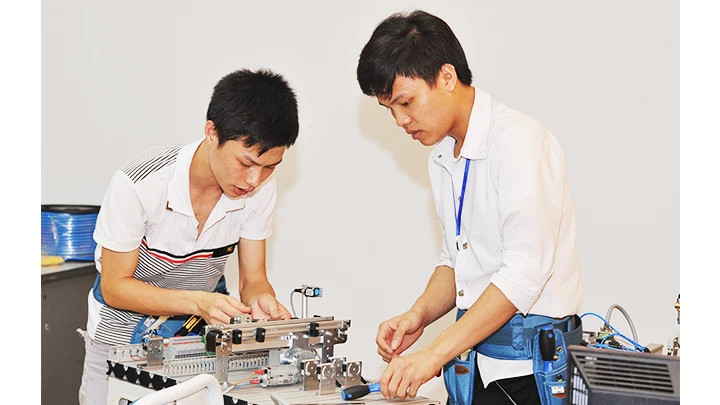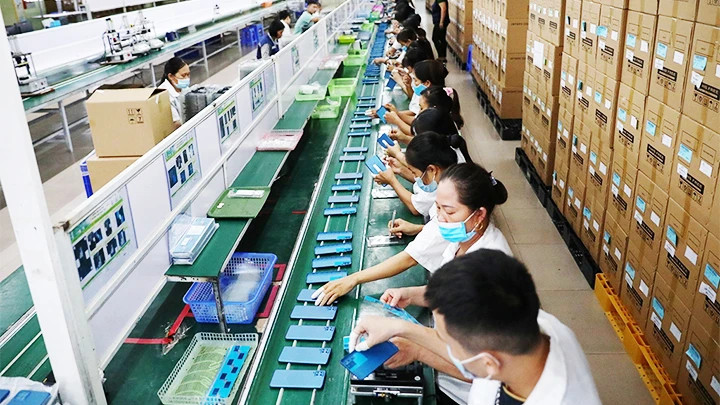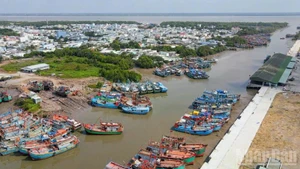18 billion USD in FDI registered in Vietnam in seven months
According to the Foreign Investment Agency under the Ministry of Planning and Investment, Vietnam registered 18 billion USD in FDI over the past seven months, an increase of over 10% compared to last year. Disbursed FDI also reached over 12.5 billion USD, up 8.4% year-on-year.
The manufacturing and processing industry led with a total investment of over 12.65 billion USD, accounting for 70.3% of the total registered capital, a 15.7% increase from the previous year. This sector also led in the number of new projects (35.1%) and capital adjustments (65.8%). The wholesale and retail sectors led in the number of capital contributions and share purchases (42.1%).
In terms of the number of projects, Ho Chi Minh City led the country with the highest number of new projects (39.1%) and capital contributions and share purchases (nearly 70.1%). Hanoi led in the number of projects with capital adjustments (14%).
The Foreign Investment Agency noted a significant improvement in the quality of FDI projects. There has been an increase in value-added investments in semiconductors, energy (including battery production, photovoltaic cells, and silicon bars), and electronic components and products.
Ninety-one countries and territories invested in Vietnam over the past seven months. Singapore was the leading investor with a total investment of nearly 6.52 billion USD, accounting for about 36.2% of the total investment, a 79.1% increase compared to the same period in 2023. Hong Kong (China) ranked second with over 2.19 billion USD, representing 12.2% of total investment, more than double compared to 2023, followed by Japan, China, the Republic of Korea, and others.
As of July 20, there are 40,777 active projects in Vietnam with a total registered capital of over 487 billion USD. The cumulative disbursed capital of FDI projects is estimated at around 309.7 billion USD, 63.6% of the total effective registered capital.
 |
| Workers assembling phones for a RoK’s company. (Photo: CUONG NGO) |
Comprehensive and substantial research and evaluation needed
Despite the overall positive trend in attracting FDI, Dr Nguyen Dinh Cung, former Director of the Central Institute for Economic Management, expressed his belief that a more detailed assessment of key indicators and limitations is necessary.
According to Dr Cung, a notable trend in FDI is the significant increase in investments from China, in terms of the number of projects and capital since 2021.
"Looking at the investment projects, it was evident that 72% of the projects are concentrated in 10 provinces around Hanoi and Ho Chi Minh City. Most of the registered capital was also concentrated in Ho Chi Minh City, Hanoi, and some surrounding provinces. Notably, while the number of projects in Ho Chi Minh City has increased significantly in recent years, the capital has decreased, leading to smaller project scales. Ho Chi Minh City's development space cannot currently attract industrial investments. Without industrial investment, large-scale projects are unlikely to materialise”, said Dr Cung.
Therefore, the expert emphasises the need for evaluations and reviews to determine how policies should be adjusted. To attract investment regionally, there must be a "boost" in motivation, changes in incentives, and adjustments in the investment portfolio.
As for technology transfer in FDI attraction, which has been discussed extensively, substantial and comprehensive research and evaluation are needed to devise effective solutions. This will help Vietnam create momentum to attract high-quality FDI in the future.
Urgent need for new investment policies
In a recent draft proposal, on the establishment, management, and use of the Investment Support Fund submitted to the Prime Minister, the Ministry of Planning and Investment (MoPI) highlights that despite growth in FDI over the years, the number of large-scale and high-tech projects remains modest.
"Some high-tech projects are showing signs of stagnation, and several companies, including Samsung, Intel, and LG, have officially announced that they are temporarily halting new investment plans or expansions in Vietnam. Additionally, some large corporations have conducted surveys and research but have either not chosen Vietnam or are waiting to see policy responses”, the MoPI reported.
Vietnam has attracted 108 foreign investment projects with a capital scale exceeding 500 million USD (an average of 15 projects per year), with only 27 projects in high-tech sectors. Since 2013, there have been only 56 large-scale projects over 500 million USD, averaging fewer than 5 projects per year.
In contrast, in May alone, Malaysia announced a series of major projects, including Microsoft's Cloud and AI project with an investment of 2.2 billion USD, Google's data centre project with an investment of 2 billion USD and several large corporations, such as ByteDance (the parent company of TikTok), which plans to invest 2.13 billion USD in a data centre. Nvidia previously also announced a partnership to build a 4.3 billion USD AI centre (announced in December 2023).
The MoPI acknowledges that, amid global economic instability and challenges, the countries compete fiercely to stabilise, encourage, and attract investment. Currently, they focus on high-tech sectors, including trends such as chips, semiconductors, and artificial intelligence (AI).
Many countries, including the US, the RoK, India, China, European nations, and neighbouring countries like Singapore, Malaysia, Indonesia, and Thailand, have implemented diverse and attractive support policies. These include combining income-based incentives (such as tax exemptions and reductions) and cost-based incentives with support packages potentially reaching billions of dollars. Thanks to their quick response to policy innovation these countries have attracted significant high-tech projects.
Therefore, the MoPI suggests that if Vietnam does not adjust its investment incentives and implementation mechanisms accordingly, the global minimum tax rate policy could diminish the effectiveness of Vietnam’s corporate income tax incentives. This would make Vietnam less attractive for retaining or attracting new investments from multinational corporations, affecting the country’s competitive position compared to regional peers and its ability to attract selective, high-quality FDI.
"Vietnam must introduce breakthrough and highly selective investment support policies to ensure competitive positioning, particularly in retaining and attracting 'eagle' companies with large supply chains and significant socio-economic impacts. The goal of the policy is to encourage all businesses that meet the criteria in priority investment areas while demonstrating the Vietnamese Government’s 'goodwill' to investors, amid changing international conditions," the MoPI stated.
The MoPI proposed that the investment support fund should be financed through state budget allocations from corporate income tax revenues following global tax base erosion regulations, other state budget sources, contributions, donations, and sponsorships from domestic and international organisations and individuals, interest from deposit accounts (if any), annual fund surpluses, and other sources. High-tech companies, those investing in high-tech product manufacturing, those applying high technology, and those investing in research and development centres would receive support from this fund.
The Ministry also cautions that if Vietnam does not quickly incorporate and adjust its corporate income tax incentives, to align with the global minimum tax rate (15%), it will not collect the tax differential, and companies investing in Vietnam will not benefit from these incentives because they will be collected by the parent company's countries.
















